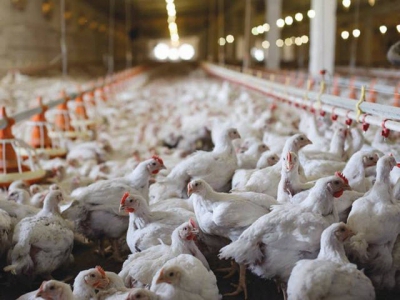5 ways to improve broiler feed efficiency beyond nutrition
After the feed arrives at the farm, there are five pointers that will help improve feed efficiency in broilers.
 Poultry farming: The robots are coming
Poultry farming: The robots are coming Predictions are that robots in poultry houses will soon surveil grow-out conditions and perform interactive tasks all around the industry.
 Understanding of chicken's environmental impact examined
Understanding of chicken's environmental impact examined National Chicken Council seeks to bridge gap between consumer perception and reality.
 Chicken gene edit prevents avian flu virus spread
Chicken gene edit prevents avian flu virus spread In laboratory-grown chicken cells, deleting section of DNA prevented avian flu virus from spreading.
 Recruiting the next generation of poultry professionals
Recruiting the next generation of poultry professionals The US Poultry & Egg Association is sponsoring programs to teach young people about the poultry industry and hopefully increase interest in working in the field
 New tools, challenges for poultry farm insect control
New tools, challenges for poultry farm insect control Insect control is an important part of poultry farm biosecurity programs and can help prevent nuisance lawsuits from neighbors.
 Genomics transforming poultry breeding
Genomics transforming poultry breeding Combining genotyping with novel statistical methods helps improve accuracy of breeding values.
 Poultry gut health may be improved under fewer light hours
Poultry gut health may be improved under fewer light hours Study is first to determine association between circadian disruption and microbiota colonization in poultry.
 Waste eggshells repurposed as sustainable energy storage
Waste eggshells repurposed as sustainable energy storage Chicken eggs are used in large quantities worldwide in the food, pharmaceutical and manufacturing industries, but after the eggs are used
 Genetic study to investigate how flu jumps species
Genetic study to investigate how flu jumps species New study will identify genes that reduce influenza A infection in pigs and chickens as well as genes that limit virus spread to people.
 US chicken producers call for equity in RFS talks
US chicken producers call for equity in RFS talks Chicken producers ask for consideration as the EPA considers changing ethanol policy in ways that could increase prices for feed corn
 Superdosing phytase in maize-based diets may boost nutrient use
Superdosing phytase in maize-based diets may boost nutrient use Increasing levels of phytase past feed formula recommendations may improve birds’ ability to use dietary nutrients in maize-based feeds, say researchers.
 Can fermented rye work as a substitute for antibiotics in broilers?
Can fermented rye work as a substitute for antibiotics in broilers? Fermented rye may inhibit pathogens and deliver immunomodulatory properties, thus providing a potential alternative for antibiotics in broiler diets
 Supplemental selenium may boost poultry immune defenses in disease challenge
Supplemental selenium may boost poultry immune defenses in disease challenge Supplementing poultry feed with selenium may support birds’ immune responses in the face of disease challenges, say researchers.
 Hatchery environment matters for embryo development
Hatchery environment matters for embryo development Air entering incubators must be preconditioned and then should be valued.
 Chicken immune genes could help breeders reduce viral infections
Chicken immune genes could help breeders reduce viral infections Some of these variations may alter the IFITM proteins, suggesting that they could have functional consequences and may affect the ability of chickens to fight
 SMART initiative to develop automated monitoring tools for live chickens
SMART initiative to develop automated monitoring tools for live chickens The SMART Broiler program will develop tools to quantitatively assess and collect information regarding key welfare indicators such as walking ability
 Moisture control in feed mills could result in real savings
Moisture control in feed mills could result in real savings Managing the moisture content in feed formulations is critical as it can compensate for weight losses during feed processing, it can also preserve the shelf
 Using and talking about evidence correctly is important. Ionophores are not antibiotics
Using and talking about evidence correctly is important. Ionophores are not antibiotics There is any real-world evidence to suggest that the use of ionophores will lead to issues with increased resistance to antibiotics of medical importance.
 In-feed boric acid use may aid chicken gut health, salmonella resistance
In-feed boric acid use may aid chicken gut health, salmonella resistance Adding boric acid to poultry feed may support gut health, limit salmonella expansion for birds facing a disease challenge, say researchers.
